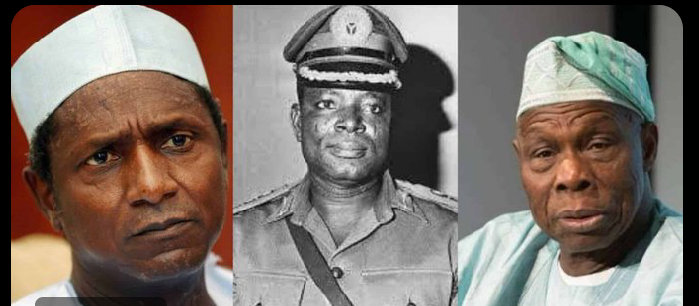
Nigeria Mourns as Former Chief of Staff to Obasanjo and Yar’Adua, General Mohammed Abdullahi, Dies at 86

Nigeria has lost one of its respected elder statesmen and distinguished military officers, General Mohammed Abdullahi (rtd), who served as Chief of Staff during the administrations of former Presidents Olusegun Obasanjo and Umaru Musa Yar’Adua. The retired general, known for his discipline, loyalty, and service to the nation, reportedly passed away at the age of 86 after a brief illness. His death marks the end of an era for many within the Nigerian military and political establishment, as Abdullahi was regarded as a bridge between the country’s old guard of soldiers and its modern political class.
Sources close to the family confirmed that the retired general breathed his last on Tuesday evening in Abuja, surrounded by his family members. Though details surrounding his death remain sketchy, it was gathered that he had been battling age-related health complications for some time. His remains are expected to be laid to rest according to Islamic rites in his home state, in line with his lifelong faith and modest character.
General Abdullahi’s name may not ring loud in the public space like some of his contemporaries, but those who worked closely with him describe him as one of the most influential figures behind the scenes in Nigeria’s leadership. He was a man who preferred to serve quietly, away from the limelight, yet his fingerprints were evident in several key national decisions and military reforms during his time in office.
Born in 1939, Abdullahi joined the Nigerian Army as a young man with a fierce passion for public service. His military career spanned over three decades, during which he earned a reputation for being highly disciplined and strategic. He was part of a generation of officers that witnessed some of the most turbulent periods in Nigeria’s history — from military coups and civil unrest to the transition to democracy. Through it all, Abdullahi maintained an image of loyalty to the country above personal ambition, earning him respect from superiors and subordinates alike.
Under President Olusegun Obasanjo, General Abdullahi served as Chief of Staff, where he played a key role in managing government affairs and coordinating between the presidency, ministries, and the armed forces. His experience as a soldier and administrator made him invaluable to the Obasanjo administration, especially during a time when Nigeria was working to rebuild its global image after years of military dictatorship. He was described as the “quiet stabilizer” in Aso Rock, the man who ensured that systems worked smoothly even in the face of political storms.
When the late President Umaru Musa Yar’Adua assumed office in 2007, Abdullahi was retained as Chief of Staff — a testament to his competence and integrity. Yar’Adua, known for his humility and respect for elder statesmen, often sought his counsel on matters of national importance. Colleagues say Abdullahi’s advice was instrumental in several policy decisions, particularly in security and governance reforms. Even after retiring from active service, he remained a trusted adviser to successive governments, occasionally offering his views on national issues through private consultations rather than public commentary.
Tributes have begun to pour in from across the country. Former President Olusegun Obasanjo, in a statement through his media office, described General Abdullahi as a dependable and disciplined officer who embodied the spirit of service. “He was a man of integrity and commitment to Nigeria’s unity. His contributions to our administration and to the military institution will never be forgotten,” Obasanjo said.
Similarly, President Bola Ahmed Tinubu expressed his condolences to the family, describing Abdullahi as a patriot who served the nation selflessly. In a statement released by the Presidential Villa, Tinubu said, “General Mohammed Abdullahi lived a life dedicated to the unity and progress of Nigeria. He served with dignity and honor, leaving behind a legacy of loyalty and leadership. The nation owes him gratitude for his years of faithful service.”
Prominent political figures and retired military officers also took to social media to share their memories of the late general. Former Vice President Atiku Abubakar referred to him as “one of Nigeria’s finest officers who believed in the power of quiet service.” Senate President Godswill Akpabio noted that Abdullahi’s death “leaves a void in the nation’s moral and institutional compass.”
Those who worked under him during his time as Chief of Staff recall his firmness and fatherly nature. A former presidential aide who served during the Obasanjo era recounted that Abdullahi was “the kind of leader who commanded respect without raising his voice.” He added, “He believed in efficiency and loyalty. If you worked for him, you knew you had to be on your toes, but you also knew he would protect you if you were honest.”
Outside the corridors of power, General Abdullahi was known for his philanthropy and devotion to community service. He quietly supported educational programs for underprivileged children in his home state and often funded scholarships for the children of fallen soldiers. He believed that education was the true weapon of development and often said that a nation that neglects its youth is building its own downfall.
In his later years, Abdullahi lived a relatively quiet life, occasionally attending national events and military anniversaries. Despite his age, he remained mentally sharp and followed political developments closely. In one of his few public appearances two years ago, he urged young Nigerians to embrace unity and shun ethnic and religious divisions, reminding them that the strength of Nigeria lies in its diversity. “We fought to keep this country one, not so that future generations would tear it apart with their words,” he said at the time.
Family members have described him as a loving father, a man of deep faith, and a firm believer in hard work and discipline. One of his sons, speaking to journalists on Wednesday morning, said, “My father was a soldier until his last breath. He believed in Nigeria, and he taught us that integrity is worth more than wealth or fame. He lived an exemplary life, and we are proud to call him our father.”
The mood in his hometown was one of deep sorrow as residents gathered to mourn his passing. Many described him as their pride, a man who rose from humble beginnings to serve the highest office in the land. Flags were seen flying at half-mast in several military establishments, and a minute of silence was observed at the Defence Headquarters in Abuja in his honor.
As Nigeria bids farewell to one of its elder statesmen, tributes continue to flood in from both within and outside the country. To many, General Mohammed Abdullahi was more than a soldier or politician — he was a symbol of quiet strength, humility, and patriotism. His life serves as a reminder that true service to one’s nation does not always come with loud applause, but with the steady hand of dedication and faith.
At 86, General Abdullahi leaves behind not only a family that loved him but also a nation that benefited from his unwavering sense of duty. His passing closes a chapter in Nigeria’s history, but his legacy of loyalty, discipline, and national service will remain a guiding light for generations to come.


